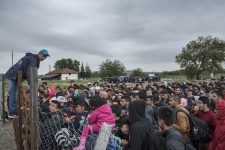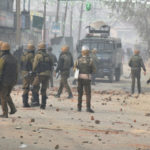High Court Rules on Offshore Detention

In a long-awaited landmark judgment, the High Court of Australia ruled this week that the Federal Government’s policy of detaining refugees in offshore detention centres is legal.
The case was brought by the Human Rights Law Centre, acting for a Bangladeshi woman who attempted to enter Australia by boat whilst pregnant. She was subsequently detained by government officials and gave birth to her child on Australian soil.
The judgment means that the woman and her child – along with 265 other asylum seekers who are currently living in Australia – will be deported back to Nauru in the near future.
91 of those flagged for deportation are children, and 33 have been born in Australia – as being born in Australia to foreign national parents does not automatically entitle a person to Australian citizenship. Legislation passed in 2014 states that babies born in Australia to asylum seekers are able to be transferred to immigration detention, meaning that they are effectively ‘stateless.’
The Case
Lawyers representing the woman argued that the offshore detention program is unconstitutional, because the Federal Government does not have power to detain refugees or enter into contracts with the Nauruan government to compel detention.
However, the High Court found that the government did in fact have the power to detain refugees offshore, pursuant to section 198AD(2) of the Migration Act, which states:
“An officer must, as soon as reasonably practicable, take an unauthorised maritime arrival to whom this section applies from Australia to a regional processing country.”
Section 51 of the Australian Constitution sets out the matters over which the Federal Government has power. One of them is the power to make laws concerning ‘naturalisation and aliens.’ The High Court ruled that this gives the government power to hold asylum seekers in custody ‘for the purposes of deportation or expulsion.’
However, the Court also stated:
‘That power is limited by the purpose of the detention and exists only so long as is reasonably necessary to effect the removal of the alien. It follows that the Commonwealth’s power to detain the plaintiff for the purpose of removing her from Australia and taking her to Nauru ceased upon her being handed over into the custody of the Government of Nauru.’
This essentially means that once asylum seekers are deported to Nauru, they become the responsibility of the Nauruan government. The High Court found that Nauru has power to detain these people under its Asylum Seekers (Regional Processing Centre) Act 2012, which allows Nauru to issue ‘RPC’ visas and detain them on the island.
What Does This Mean for Asylum Seekers?
The High Court ruling is a hard blow to asylum seekers who are facing the prospect of deportation to offshore detention centres, as it extinguishes any hope of remaining on the mainland.
This is despite numerous doctors, welfare agencies and experts expressing grave concerns about the appalling conditions at the facility – particularly after allegations emerged last year that a five-year-old boy was sexually assaulted at the centre.
The boy has been receiving medical treatment on the mainland – but after the High Court’s ruling, he may be sent back to Nauru, where his alleged attacker is still present.
Dr Karen Zwi, who examined the boy, says the boy is exhibiting concerning symptoms consistent with abuse:
‘Like many other children who are very distressed he regressed, he began bed-wetting, he became very anxious about his mother’s well being, he actually began to self-harm.
…That is this huge cloud hanging over him – that he will be returned to an absolutely traumatic and devastating environment for him.’
Dr Zwi has dealt with many other children at the detention centre, reporting that many have endured trauma and abuse:
‘These kids feel to me like they’ve been through a mincing machine…They’ve had one traumatic event after another. I sometimes feel they are broken into little bits and it’s really hard to put the pieces back together again.’
As discussed in a previous blog, Dr Zwi and other ‘entrusted persons’ who speak out about the horrific conditions within offshore processing centres risk criminal prosecution under the new Australian Border Force Act 2015.
Section 42 of that Act imposes a maximum penalty of 2 years imprisonment for those who release protected information received as part of their employment.
A number of international agencies have condemned Australia’s approach to immigration detention – particularly its treatment of kids and babies, which spend months or even years in tents behind barbed wire fences in the searing heat, vulnerable to a multitude of abuses.
Last year, the United Nations Special Rapporteur on torture and other cruel, inhuman or degrading treatment or punishment released a statement saying:
‘…by failing to provide adequate detention conditions; end the practice of detention of children; and put a stop to the escalating violence and tension at the Regional Processing Centre, [Australia] has violated the right of the asylum seekers, including children, to be free from torture or cruel, inhuman or degrading treatment.’
Despite these statements, the Australian government remains unwavering in its approach, with Prime Minister Malcolm Turnbull stating:
‘The people smugglers will not prevail over our sovereignty…Our borders are secure. The line has to be drawn somewhere and it is drawn at our border.’
The Police Commissioner of Nauru, Corey Caleb, went one step further, accusing asylum seekers of fabricating allegations of assault and sexual assault. He has blamed journalists for spreading ‘lies,’ and says asylum seekers ‘tell us they have been assaulted but their stories seldom add up.’
Despite the Court’s ruling, Australian Human Rights Commissioner Gillian Triggs has begged the government to show some compassion and put an end to offshore detention:
‘Today’s High Court decision in no way requires the Government to return the children and their families to Nauru.
The Minister for Immigration has discretion to decide whether or not they will be sent back.
Given the risk of harm to these children and their need for ongoing medical care, we strongly urge the Government not to return them to Nauru.’
It seems that the immediate future is bleak for these vulnerable men, women and children.






